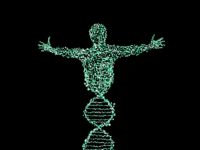The possible inheritance of unfavorable genetics sits in the front of many new and soon-to-be parents’ minds. Though it may seem comforting to know if one’s child carries the risk of developing certain conditions in adulthood, is it in the best interest of the child to grow up with this knowledge? This burden poses an ethical dilemma in genetic testing through undue mental strain on both children and parents, as well as potential misuse for the benefit of individuals other than the children themselves.
“The complexities of disease risk are difficult to understand at all ages, but particularly so for children.”
The American Academy of Pediatrics and the American College of Medical Genetics do not recommend genetic testing for adult-onset conditions for individuals younger than 18 years old. The complexities of disease risk are difficult to understand at all ages, but particularly so for children. Without the cognitive abilities to differentiate a possibility from a certainty, children informed that they carry a potentially dangerous gene may believe that they will inevitably develop that condition. For example, female inheritors of the Brac1 gene variant have a 55%–72% likelihood of having breast cancer during their lifetime. Though this is a legitimate concern for the individual’s future, a cancer diagnosis is not inevitable and, more importantly, is unlikely in childhood seeing as breast cancer is an adult-onset disease. There is little benefit to telling a child they may develop cancer if they are unable to address the issue until adulthood. In addition, this knowledge may weigh on parents who are likewise unable to act on the test results, thus it is not beneficial to receive genetic screening for this gene and similar ones as a child.
“children are not legally or ethically obligated to act as a tool for their parents’ health.”
Ethical concerns about childhood genetic testing came to the forefront after the completion of the BabySeq Project by the National Institutes of Health. The study aimed to sequence the genomes of newborns and infants to identify the practicality of completing sequencing as common practice in postpartum care. However, researchers in the study noticed that they felt compelled to share genetic information with parents not only out of concern for the child but also to identify the parents as potentially having harmful mutations as well. Therefore, the children’s genomic information was being utilized as a healthcare resource for both themselves and others. In acknowledgment of this possibility, the study was redesigned to require parents to explicitly opt into testing their children for adult-onset conditions. Contributors to the BabySeq Project have stated that this usage of genetic information is ultimately beneficial to the children by positively supporting parental health. However, children are not legally or ethically obligated to act as a tool for their parents’ health. The permittance of pediatric genetic testing opens the door to an abuse of power on the part of relatives and blatantly ignores the child’s right to consent to receiving and acting on this information as an adult. The study of adult-onset diseases in children’s genomes fails to prioritize patients’ medical autonomy and mental burden in the event of high mutation risk.
Pediatric genetic screening for conditions affecting primarily the adult population is controversial due to its ability to cause emotional harm to developing families and its capacity to take advantage of genomic data to benefit other parties. Maintaining ethical limits on genetic testing would allow children to avoid inappropriately preemptive information regarding adult-onset conditions, while also preventing the use of their genetic composition as a means to promote the health of another person. When asking ourselves whether children should know about their future genetic possibilities or whether their DNA should be used to clarify the risks of others, we should be asking a simple question: does this testing ultimately benefit the child at this moment? Through this lens, children are not obligated to carry the burden of their potential risks or those of others on their shoulders, and an effective healthcare system should not prescribe this false obligation to the detriment of patients.
Image courtesy of Public Domain Pictures






